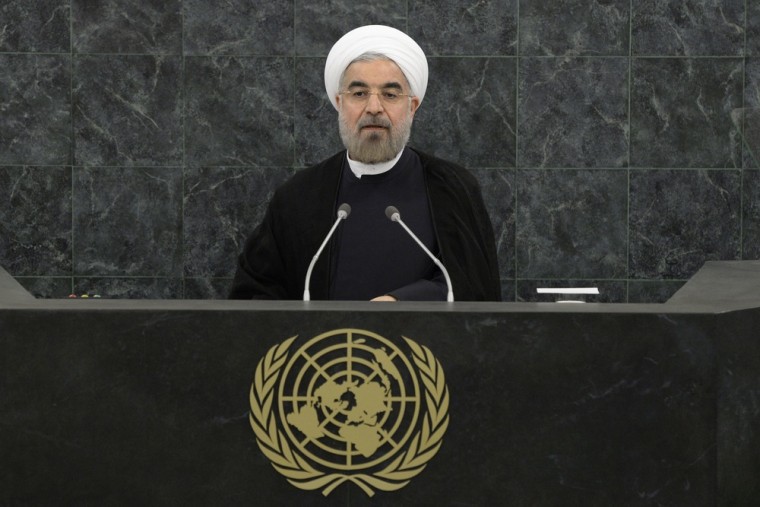
TEHRAN – Some Iranians woke up disappointed Wednesday, their hopes of a historic meeting between the country’s new President Hassan Rouhani and President Barack Obama dashed, while others maintained their distrust of America.
Despite speculation about a potential handshake on the sidelines of the luncheon at the United Nations General Assembly – or even a meal eaten in the same room – neither happened. White House officials said a handshake would have been “too complicated” for Rouhani at home in Iran, and Rouhani was a no-show at the luncheon.
“It is a shame they did not shake hands, I would have liked to see that. It would have been a big step forward,” said Fateme, a 30-year-old secretary who declined to give her last name.
But Fateme chalked it up to long-held positions in Iran. “Some people in the country don’t want relations with America and Rouhani is answerable to them. Politics in our country can be very tricky and the president has to tread a fine line.”
Rouhani addressed the handshake issue during an informal conversation with a small group of U.S. reporters, including NBC News, on Wednesday.
“We have no problem shaking Mr. Obama's hand or negotiating, but we need a plan of action to ensure these meetings create the conclusions that we want," he said. "We did not have enough time to make it happen.
"This is a very sensitive subject. We have not talked at that level for 35 years. We must take these steps carefully."
During his address to the U.N., Rouhani said Iran posed “absolutely no threat to the world,” and he also decried the “brutal oppression of the Palestinian people.”
He also slammed economic sanctions against Iran as being “violent – pure and simple.” He likely appealed to his Iranian audience when he said, “it is the common people who are victimized by these sanctions.”
The United States, the European Union and the U.N. have imposed tough economic sanctions on Iran as a way to persuade Tehran to abandon its nuclear program. For many Iranians, the sanctions have been so crippling, they just want them to end.
“God willing, Iran and America will make a deal and these sanctions will be lifted,” said Fateme. “We all just want life to become easier.”
Mohsen Ahmadi, a 34-year-old businessman who owns a food distribution company, said he was “very encouraged by President Obama's comments” – particularly about the historic tension between the two countries.
Obama said: “The United States and Iran have been isolated from one another since the Islamic Revolution of 1979. This mistrust has deep roots. Iranians have long complained of a history of U.S. interference in their affairs, and America’s role in overthrowing an Iranian government during the Cold War.”
Obama was referring to the 1953 Iranian coup d’etat that was orchestrated by the U.K. and U.S. to restore the shah of Iran to power.
“This was a very sore subject for us and it is good that Obama acknowledged this,”said Ahmadi. “I don’t think any other American president has spoken about this. Let’s hope this friendly talk continues and we can resolve our differences."
Others were not swayed by either Rouhani or Obama’s speech at the U.N.
"I don’t trust America, our great country should be very careful talking to the Americans – they want this region to go up in smoke,” said Farhad Esmalzhade, a 56-year-old cab driver. “They have destroyed Iraq, Afghanistan; they want to destroy Syria and I am sure we will be next.”
For his part, Israel’s Prime Minister Benjamin Netanyahu was not swayed by Rouhani’s comments either, and said the address was a “cynical speech full of hypocrisy.”
In a statement following Rouhani’s remarks, Netanyahu warned that “the international community must test Iran not by its words, but by its actions.”
Some Iranians were equally skeptical that relations could change much given the U.S.-Israeli alliance
Reza Mahmoodi, a 24-year-old student, was hopeful that the new Iranian president could work with the U.S., but added that “the Israelis have a lot of influence in America and they don’t want Iran to progress, they will probably get their way.”
Related: